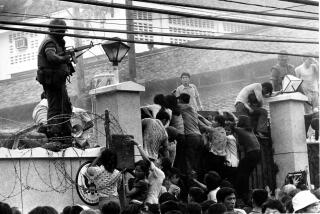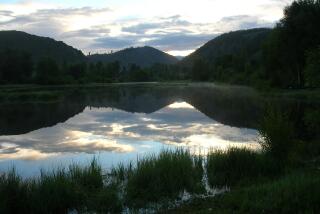Of American Dreams and Henry Fonda Possibilities
- Share via
GRAND ISLAND, Neb. — Like a scene from an old western, the wagon train rumbles into this town on the banks of the Platte River.
Here, as in every town we’ve come to, children run alongside us on the sidewalks. Men shout with excitement when we round the corner into town. We really put on a show for them today, with the teamsters running the horses into the park, flags flying. The outriders came trotting in, and they all pulled up in a circle and stopped at the same time. Not bad.
We’re getting better and better at this as the days go by. The people even stay to cheer our slow and lowly handcart company.
The townspeople run to take pictures with the draft horses, they stare in intimidation at the trail boss, they laugh at John the Tennessee mule skinner and his stubborn team.
They don’t know how cold we were all night, or hear how good Christian women curse under their breath when the wake-up bell starts clanging at 4:30 a.m. They don’t know that we’re three days from the last shower, that we didn’t like the lunch, that the road was wet and the wheels sank into the sand.
Something happens to us when we see the crowds lining the streets up ahead waiting for us. We straighten our backs and stride with purpose. We smile, we wave and shout hello.
We think we look pretty authentic in our pioneer costumes. But no matter how hard they try, people can’t seem to keep themselves from smiling when they see the Sekiguchi family from Tokyo in their pioneer duds.
*
The other members of the wagon train and I have been trying to help the Sekiguchis feel at home on the American prairie. But we haven’t been able to find much to talk about. Osamu, the father, speaks English comfortably. His wife, Takako, speaks haltingly, and the boys, Yuji, 9, and Koji, 7, know only a few words.
I ask Takako if America was what she expected it to be. “Oh, it’s wonderful,” she answers. “We watched movies to see what would be here.”
Which, of course, makes her no different from a large percentage of Americans. I am straining for something else to ask her to keep the conversation going. Her next question catches me off guard.
“When we came into the town I saw a sign--Henry Fonda Memorial. . . .” Her voice trails off. “He lived here?” she asks.
“Henry Fonda?” I reply, surprised. “I thought he was from Omaha. Let me check, one minute.” I find a local man and ask him, and he says, “Oh, yeah, Henry was born right here in Grand Island. The house is over in the railroad town. It’s 5 o’clock, though--everything is closed.”
They can’t close, for crying out loud; we finally have something to talk about.
Takako and I and the boys head for the railroad town, where historic homes from around the city have been collected. We run down the street till we find a cottage with a sign: “Henry Fonda House.” Closed. I run around the back of the house and catch the docent just locking the back door.
“Please let us in,” I beg. “They’ve come all the way from Japan, and they love Henry Fonda. They just want to see the house. It will only take two minutes, I promise.”
Inside, Takako and the boys are all smiles. “Henry,” they say and point to the pictures. The docent gives them the basics: “This is the room where Henry was born.” “Henry,” like he’s her cousin.
“ ‘Course he only lived here till he was 6 months old. Then the family moved to Omaha.” No matter, Grand Island is awfully proud of those six months, and Takako and the boys are respectful of this bounty of American heritage vested in Grand Island.
Koji and Yuji insist on having their picture taken with the baby picture of Henry Fonda. Takako is thrilled. She keeps saying, “Henry Fonda House!”
We take a little longer than two minutes, but the docent is so wrapped up in the legacy of her town’s Favorite Son that she doesn’t mind. We leave the little green house, and the Sekiguchis run off to dinner.
I return at dusk to sit on the porch of the little green house and type away on my laptop computer.
John Wayne, Clark Gable and others are men that many Americans wish they were--or wish they knew. But from what I’ve seen, Henry Fonda is who they think they are--not all that big, not all that good-looking. Not born with life handed to him. Just an ordinary guy who lives an ordinary life, works hard and minds his own business. But, once in his life, he finds himself in the middle of a situation that calls for a hero. But there isn’t one around, so the ordinary man steps up, does or says whatever it is that needs doing or saying, then goes back to his ordinary life. And he doesn’t gloat, and he doesn’t think he’s better than the people around him.
It seems to me that with their Henry Fonda movies, Takako and her family prepared themselves well for their pioneer trek.
What we are doing is a celebration of what ordinary people can accomplish under extraordinary circumstances. Of the more than 60,000 men, women and children who crossed this trail, only one, Brigham Young, is well-known. The rest were just ordinary hard-working people who found themselves in a situation that called for the strength and fortitude of people braver than they thought themselves to be. They accomplished the impossible because they had to, and then went back to their ordinary lives.
Their almost accidental heroism lifts us above the smallness of our day-to-day lives. It reminds us of the possibilities.
Same as the Grand Islanders with their Henry Fonda House.
That Henry moved to Omaha before he was out of diapers matters not at all. That this house actually had little or nothing to do with what he became and what he came to mean to people doesn’t matter. What matters is that this little green house reminds people of the possibilities.
It seems the same reason that grown men shout with excitement as the wagon train rolls into town. Whether spectators or participants, we feel our options widen by seeing ordinary people doing something really big.
And we feel freer and finer, almost as if we were keepers of a secret, sitting on wooden porches in a quiet, unassuming prairie town where baby boys with endless possibilities are born into the world and named Henry.
* Kathy Stickel, 27, of Huntington Beach is filing periodic reports from the Mormon Trail Wagon Train, which is retracing the 1,000-mile route of the Mormon migration from Iowa to Utah 150 years ago.
More to Read
Sign up for The Wild
We’ll help you find the best places to hike, bike and run, as well as the perfect silent spots for meditation and yoga.
You may occasionally receive promotional content from the Los Angeles Times.






